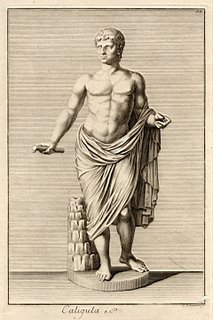January 24
 If the written accounts of Caligula's life are to be believed, his assassination on this date in anno domini 41 passed without significant mourning. The fourth of the so-called "twelve Caesars," Gaius Julius Caesar Augustus Germanicus earned the nickname "Caligula" -- meaning "little boot" -- as a young boy, after the miniature soldier's uniform in which his father used to dress him. Shortly after assuming the title of Emperor in the year 37, Caligula was striken by a still-undetermined affliction and emerged from his convalescence an unparalleled monster. His reputation as a moral degenerate, already secured by the time he ascended to office, only magnified over the next four years. The Roman biographer Suetonius later described Caligula as a thin-skinned, deranged sadist. He lay in incest with his sisters; he fed criminals to the lions when raw beef was scarce; he closed the granaries merely to watch his people starve a bit. He drank pearls dissolved in vinegar and had gold cast in the shape of bread loaves. He is reported to have wished that "the Roman people had but a single neck," the better to throttle his subjects all at once.
If the written accounts of Caligula's life are to be believed, his assassination on this date in anno domini 41 passed without significant mourning. The fourth of the so-called "twelve Caesars," Gaius Julius Caesar Augustus Germanicus earned the nickname "Caligula" -- meaning "little boot" -- as a young boy, after the miniature soldier's uniform in which his father used to dress him. Shortly after assuming the title of Emperor in the year 37, Caligula was striken by a still-undetermined affliction and emerged from his convalescence an unparalleled monster. His reputation as a moral degenerate, already secured by the time he ascended to office, only magnified over the next four years. The Roman biographer Suetonius later described Caligula as a thin-skinned, deranged sadist. He lay in incest with his sisters; he fed criminals to the lions when raw beef was scarce; he closed the granaries merely to watch his people starve a bit. He drank pearls dissolved in vinegar and had gold cast in the shape of bread loaves. He is reported to have wished that "the Roman people had but a single neck," the better to throttle his subjects all at once.In The Lives of the Caesars, the chapter devoted to Caligula is more or less a stomach-turning recitation of his crimes against nature and humanity. As Suetonius writes,
Many men of honourable rank were first disfigured with the marks of branding-irons and then condemned to the mines, to work at building roads, or to be thrown to the wild beasts; or else he shut them up in cages on all fours, like animals, or had them sawn asunder. Not all these punishments were for serious offences, but merely for criticising one of his shows, or for never having sworn by his Genius. He forced parents to attend the executions of their sons . . . . He had the manager of his gladiatorial shows and beast-baitings beaten with chains in his presence for several successive days, and would not kill him until he was disgusted at the stench of his putrefied brain. He burned a writer of Atellan farces alive in the middle of the arena of the amphitheatre, because of a humorous line of double meaning. When a Roman knight on being thrown to the wild beasts loudly protested his innocence, he took him out, cut off his tongue, and put him back again.Eventually, Caligula declared himself to be a god. After less than four years of rule, Caligula was stabbed to death by Cassius Chaerea and a mob of fellow guardsmen; according to several accounts, the assassination -- though planned in advance -- was instigated when Caligula insulted Chaerea's wounded penis one too many times.
As the Roman historian Cassius Dio later quipped, in death Caligula "learned by actual experience that he was not a god."